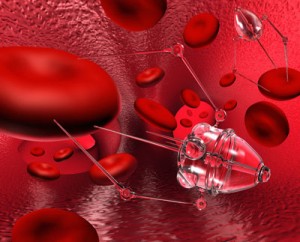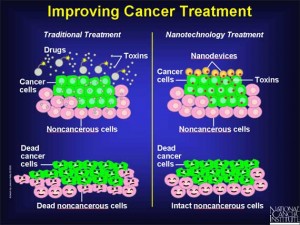By Makena Murugu, Ryan Cope, and Camil Mikiej
On today’s edition of Today in Technology, our host Bob interviews our guest, Dr. Doolittle, on her fascinating research in cancer therapy by using nanotechnology to implement new strategies, such as increased accuracy in drug delivery, which will potentially eliminate chemotherapy. Dr. Doolittle unveils why this new form of cancer therapy will be able to bypass former barriers such as biological limits or the physical disadvantages of chemotherapy. She explains how nanotechnology uses factors such as pH to target only cancerous cells and does not affect healthy cells at all, as seen in the figure below. Listen to be enlightened on the technology of the future!


This podcast was done very well. It was very interesting to see how nanotechnology has a big impact on research in cancer therapy. Also how nanotechnology can be used to eliminate chemotherapy and only targets the cancerous cells.
First off, loving the names… also liked how you listed the down side of current cancer treatment especially the side effects to full body chemo. Although obviously it is not your fault, it aggravated me hearing that the reason this technology is struggling is do too money. It seems that with a cure to a sickness that affects so many people worldwide, it should be a huge priority to find a way to make it more cost efficient which, based off the details of this podcast, does not appear to be happening.
You did a good job here! I like how you guys outlined the negative consequences of current cancer treatment in order to persuade the audience to be more accepting of nano-treatment. Nano-sensors seem to be the most interesting to me, as they would greatly increase precision when it comes to treating cancer cells. It seems, however, that we would need to approach the eventual common use of nano-sensors with extreme caution; considering that cancer cells are the mutated cells of the person in question, we would need to be extra careful to develop technology that can tell even the tiniest difference between normal cells and cancer cells in order to prevent the accidental creation of a man-made, technological virus that targets good cells as well as sick cells.
Great podcast, it gave me a better understanding of the overview of how cancer cells are attacked within the body and the role that nanotechnology plays. What is your personal opinion on the ethics involved in the fact that only those in good economic standing can afford access to these treatment options? Do you think it is fair to continue developing this technology at its current rate, or do you believe that it should slow down in order for the FDA laws and politics behind making this to catch up?
It was very interesting to learn about how nanotechnology can affect cancer therapy. I liked how you pointed out how current cancer treatment has many adverse affects in order to sway the listener in the direction of nano vectors. The cost of using nanotechnology to treat cancer must also be taken into account, however, I like how you also explained the current societal constraints around using this type of technology in order to treat cancer.